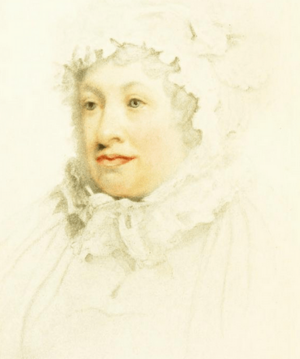Helen D'Arcy Stewart facts for kids
Helen D'Arcy Stewart (born Cranstoun; 1765–1838) was a Scottish poet. She was also a well-known hostess in Edinburgh in the late 1700s and early 1800s. She was married to Dugald Stewart, an important Scottish philosopher and mathematician. He was famous for sharing the ideas of the Scottish Enlightenment.
Contents
Biography
Early Life and Talents
Helen D'Arcy Stewart was born on March 13, 1765. She was the third daughter of George Cranstoun. Her siblings included George Cranstoun, Lord Corehouse, and Jane Ann, Countess Purgstall. Both were close friends with Sir Walter Scott. Her mother was Maria Brisbane.
From a young age, Helen was known for her charm and intelligence. She loved poetry and wrote many verses. People who read her poems, even strangers, praised them. They said her poems showed her "graceful taste and sensibility" and her "playful wit."
Marriage to Dugald Stewart
Helen's poetry actually led to her marriage. Her cousin, Lord Lothian, showed one of her poems to Mr. Stewart. At the time, Mr. Stewart was Lord Lothian's private tutor. The philosopher was so impressed by the poem that he wanted to meet Helen.
They met and later married on July 26, 1790. Helen was 25 years old, and Dugald was 37. Their marriage was very happy for both of them. Helen admired her husband greatly. Dugald trusted his wife's judgment completely. He would show her all his writings. She was his constant companion during his studies. He never thought a piece of his writing was finished until she had reviewed it. He once said that Helen helped him explain difficult ideas. She did this "by a play of fancy and of feeling which could only come from a woman's mind."
A Popular Hostess
Helen was not boastful about her knowledge. She did not try to show off how much she knew. Lord Dudley, a friend, once wrote that she had "as much knowledge, understanding, and wit as would set up three foreign ladies as first-rate talkers."
Because of her gifts and charm, she had many devoted friends. As the wife of Dugald Stewart, whose reputation grew, her home in Edinburgh became a popular meeting place. It was where all the important thinkers in Scotland would gather. People visiting Scotland often wanted to be introduced to Mrs. Dugald Stewart. It was said that a letter of introduction from her was a great recommendation in the intellectual world of England or America.
A young man named John Ward, who later became the 1st Earl of Dudley, stayed with the Stewart family. This was in 1797 and 1798. His letters to Helen Stewart were later collected in a book.
Helen Stewart passed away at Warriston House, Edinburgh, on July 28, 1838. An obituary described her character. It said she was "remarkable for a winning gentleness of manner." This gentleness helped her influence those around her more than others could by acting important.
Family Life
Dugald Stewart and Helen had two children. Their son, George, died in 1809. Their daughter, Maria d'Arcy, never married and passed away in 1846.
Her Writings
Not much of Helen Stewart's writing was published. Her poem The tears I shed must ever fall was noticed by the famous poet Robert Burns. He called it a "song of genius." He even wrote the first four lines for the final part of the poem. This poem, and others, were published in Johnson's Scots Musical Museum in 1792. Her obituary mentioned that she was considered a very good writer of Scottish songs.
 | Leon Lynch |
 | Milton P. Webster |
 | Ferdinand Smith |


